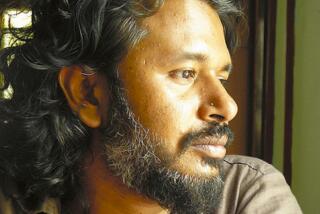The Personal, Political Intertwine
- Share via
Just off the southern tip of the Indian subcontinent is a tropical paradise with lovely beaches, lush jungles and pleasant highlands providing relief when the weather turns too sultry. The island nation of Sri Lanka, formerly known as Ceylon, gained its independence from Britain in 1948. For many years it was best known in the rest of the world as a major exporter of tea. Then, in the 1980s, it became the scene of appalling ethnic warfare between its majority population of Sinhalese Buddhists and the minority Hindu Tamils. The problem is still not resolved.
Sri Lanka-born novelist Shyam Selvadurai and his family left the country in the wake of the 1983 riots to settle in Canada. His first novel, “Funny Boy,” about a young gay man coming of age, won the Lambda Literary Award. In his second novel, “Cinnamon Gardens,” Selvadurai takes us back to the late 1920s, when the British Donoughmore Commission was visiting Ceylon and investigating the case for some form of self-rule.
Much is going on in this novel’s background: strikes, labor unrest, harsh repression. Nor, by any means, are all those doing the repressing British. Among the country’s non-European elite are the Tamils, originally from India. Most Tamils are Hindu, but some are converted to Christianity, a few even intermarried with the English. Though anxious to run their own affairs, the prospect of universal franchise alarms them. The leading families of the country’s capital, Colombo, live in a luxurious enclave known as Cinnamon Gardens.
The two main characters are cousins, both finding themselves in conflict with the strictures of their society and the expectations of their families. Annalukshmi is a highly intelligent, thoughtful and well-educated young woman who longs to become a teacher. Annalukshmi’s father was once a rebel who defied his own father to marry a Christian woman. He was happy to treat his oldest daughter as he would a son, encouraging her to receive an education. But more recently, in the wake of his own father’s death, Annalukshmi’s father has been returning to the traditions he once despised. Much to his daughter’s horror, he plans to marry her off to a Hindu of the old school. This would not only spell the end of her career as a teacher but would consign her to a household where she and other women would live in obedient seclusion.
Annalukshmi’s cousin, Balendran, is a man of 40, married to a sympathetic and intelligent Englishwoman by whom he has a son now studying in England. Twenty years ago, when Balendran was a student in England, he became involved in an intense love affair with a fellow student, an Englishman named Richard Howland. The affair ended humiliatingly and brutally when Balendran’s father arrived on the scene and broke it up. Balendran’s father holds the high official position of Mudaliyar, a prominent Ceylonese appointed by the British governor to serve in an advisory capacity.
Indulged since infancy and used to getting his way, the Mudaliyar had already banished his older son for marrying a lower-caste woman. Balendran is the one he has anointed as his second-in-command. For the last 20 years, Balendran has found satisfaction in taking up the life his father has planned for him. He has even been able to enact some enlightened reforms in the running of his father’s estate. But now, his old flame, Howland, is coming to Sri Lanka along with the Donoughmore Commission, and his father has the gall to ask him to prevail on Howland to influence the commission to see things from the Mudaliyar’s position of entrenched privilege.
Selvadurai has crafted a novel that clearly illustrates just how deeply and inextricably intertwined the personal and the political can be. Inevitably, he is looking back at this historical period from a perspective that owes something to postmodern women’s and gay liberation movements. Yet feminism was already a strong movement in the early decades of this century, and a more enlightened attitude toward homosexuality was beginning to emerge in some circles, so one does not feel that this author is merely imposing the values of his own era on that earlier age. Selvadurai offers a convincing portrait of the complicated web of social, familial and cultural entanglements that make it so challenging for his heroine and his hero to be true--either to their principles or to their hearts.
More to Read
Sign up for our Book Club newsletter
Get the latest news, events and more from the Los Angeles Times Book Club, and help us get L.A. reading and talking.
You may occasionally receive promotional content from the Los Angeles Times.








